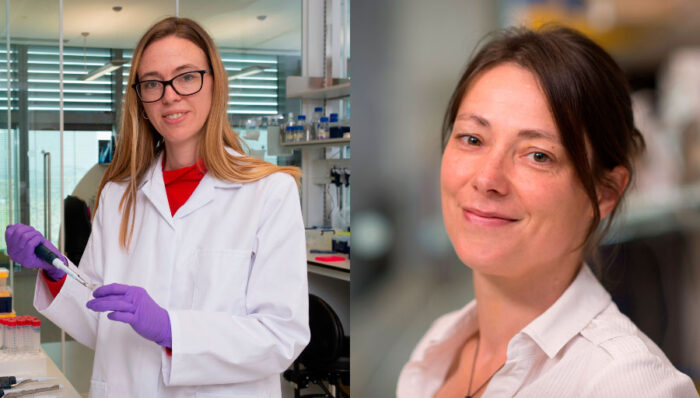
The European Molecular Biology Organisation (EMBO) has recognised two LMB-based researchers in their intake of new members. Madeline Lancaster is a Group Leader in the LMB’s Cell Biology Division, and Menna Clatworthy is a Group Leader in the University of Cambridge Molecular Immunity Unit, housed at the LMB.
EMBO aims to foster excellence in life science research, support researchers throughout their careers, stimulate the interchange of scientific knowledge and help build a research environment where scientists can flourish. To this end it has elected over 1800 researchers to EMBO Membership. New members are elected annually, by the existing membership, in recognition of their contribution to scientific excellence.
Madeline Lancaster
Madeline’s research has led to unprecedented insights into the development of the human brain. Using cerebral organoids generated from stem cells, Madeline is able to model complex, human brain development in vitro. In this model, human brain tissue is able to self-organise to form a structure resembling the brain, allowing Madeline and her group to address fundamental questions of life, including why humans have comparatively large brains compared to other mammalian species.
Her group also use organoids to investigate the cellular mechanisms behind uniquely human neurodevelopmental disorders, such as autism and intellectual disability. During the COVID-19 pandemic, Madeline’s group used brain organoids to determine how the SARS-CoV-2 virus infects brain cells, which has the potential to lead to long-term neurological complications.
Madeline commented, “I am honoured to join this prestigious organisation. Without all the hard work of my team this would not have been possible! I look forward to many fruitful interactions with other EMBO members.”
Madeline received an undergraduate degree in Biochemistry from Occidental College, Los Angeles before completing a PhD in Biomedical Sciences at the University of California, San Diego. She first developed brain organoids during a postdoctoral placement at The Institute of Molecular Biotechnology of the Austrian Academy of Sciences (IMBA). She joined the LMB as a Group Leader in 2015.
Menna Clatworthy
Menna’s research is focused on better understanding of human tissue immunity, specifically looking at how immune cells in organs including the bladder, kidneys, prostate, gut and meninges adapt to tissue-specific environmental cues. To this end, her group has determined how immune cells derived from the gut defend the meninges lining the brain from microbial invasion and infection, and how a single molecule within the gut directs the immune response towards wound healing or bacterial defence – a system that, when unbalanced, is a hallmark of Inflammatory Bowel Disease.
In response to the COVID-19 pandemic, Menna began studying immune cells in peripheral blood, nasal and lung tissues to better understand how the immune system responds to SARS-CoV2, and how this might contribute to pathology. Her group also contributed to a large, collaborative study, in which 800,000 immune cells were analysed to investigate how immune responses differ between asymptomatic cases and people with severe COVID-19.
Menna responded to the news, “I am delighted to be recognised by EMBO. My work over the years has spanned from clinical studies through to single cell molecular mapping and has required an enormous collaborative effort. I am grateful for the support and hard work of my research team, colleagues and collaborators, as well as the generosity of patients and tissue donors, without which we would not made the progress we have in understanding human tissue immunity. EMBO plays an invaluable role in promoting scientific partnerships across countries to foster high-quality collaborative science, and I look forward to contributing to this goal in the future.”
Menna studied anatomy and received a MBBCh (Honours) degree from the University of Wales, before earning a Membership of the Royal Colleges of Physicians. She also completed a PhD in Immunology from Pembroke College, University of Cambridge. She established her own group in Cambridge in 2013, and was promoted to Professor of Translational Immunology in 2019. Menna divides her time between research, teaching, and clinical practice in transplantation and necrophrology.
Also included in the list of EMBO’s new members are LMB alumni Julian Rayner and Friedrich (Freddy) Frischknecht. Julian joined the LMB’s Cell Biology Division in 1993, first as a PhD student with Hugh Pelham and then as a postdoc in Sean Munro’s group until 1998 and is now Director of The Cambridge Institute for Medical Research (CIMR), University of Cambridge. Freddy was a student visitor with Andrew Randell in the LMB’s Neurobiology Division from 1995-1996 and is now a Group Leader at University Hospital, Heidelberg.
Further references
Madeline’s group page
Menna’s group page
Julian Rayner’s page
Friedrich (Freddy) Frischknecht’s page
EMBO press release